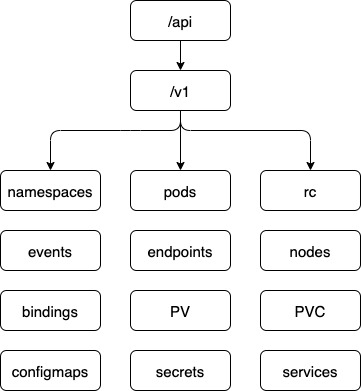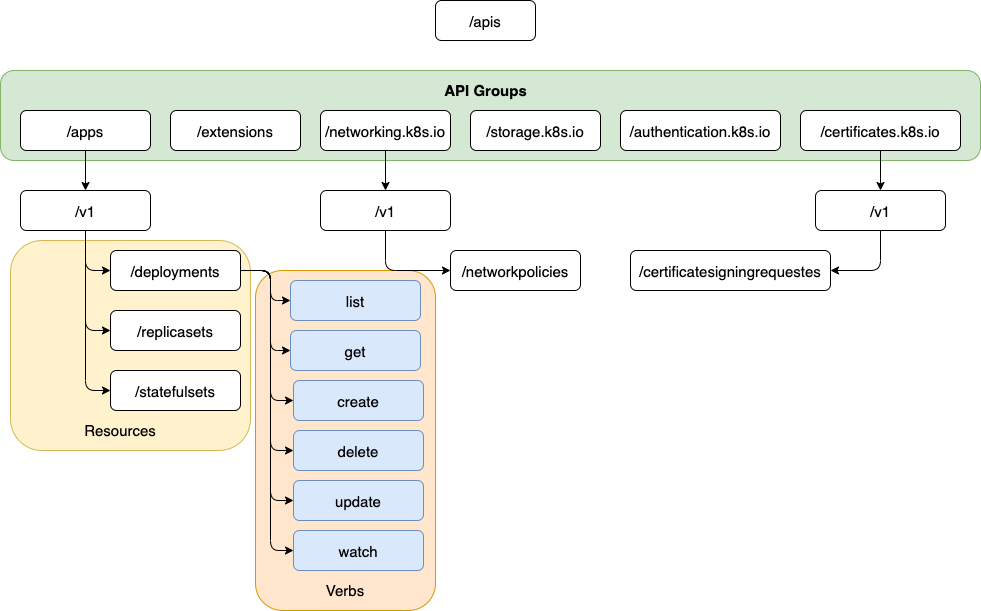What is the Kubernetes API?
Kube-apiserver, whatever operations we have done so far with the cluster, we have been interacting with the apiserver one way or the other. either through the kubectl utility or directly.
$ kubectl config view
apiVersion: v1
clusters:
- cluster:
certificate-authority-data: DATA+OMITTED
server: https://192.168.56.2:6443
name: kubernetes
contexts:
- context:
cluster: kubernetes
namespace: production
user: kubernetes-admin
name: kubernetes-admin@kubernetes
current-context: kubernetes-admin@kubernetes
kind: Config
preferences: {}
users:
- name: kubernetes-admin
user:
client-certificate-data: REDACTED
client-key-data: REDACTEDcurl https://192.168.56.2:6443/version
curl https://192.168.56.2:6443/api/v1/pods The Kubernetes API is grouped into multiple such groups based on their purpose such as
/api/apis/logs/version/healthz/metrics
The version API is for viewing the /version of the cluster, and the /metrics and /healthz api is used to monitor the health of the cluster. The logs for integrating with third-party logging applications.
/api : the core group
The core group is where all core functionality exists. Such as namespaces, pods, replication controllers, events, endpoints, nodes, bindings, persistent volume, persistent volume claims, configmaps, secrets, services etc.

/apis : the named group
The named group api is more organized.
it has groups under it for apps, extensions, networking, storage, authentication, authorization certificates etc. For example) apps you have deployments, replicatsets, statefulsets.

https://kubernetes.io/docs/reference/generated/kubernetes-api/v1.20/
The Kubernetes API reference page can tell you what the API group is for each object select an object and the first section in the decumentation page shows its group details v1/core is just v1
you can also see the avaiable api groups.
curl https://192.168.56.2:6443 -k
curl https://192.168.56.2:6443 -k | grep "name"if you were to access the API directly through curl as shown here, then you will not be allowed access except for certain APIs like version as you have not specified any authentication mechanisms.
$ curl https://localhost:6443 -k
{
"kind": "Status",
"apiVersion": "v1",
"metadata": {
},
"status": "Failure",
"message": "forbidden: User \"system:anonymous\" cannot get path \"/\"",
"reason": "Forbidden",
"details": {
},
"code": 403
}To solve this,
Option 1 with certificate
curl https://localhost:6443 -k
--key admin.key
--cert admin.crt
--cacert ca.crtOption 2 with kubectl proxy client
the kubectl proxy command, launches a proxy service locally on port 8001 and uses credentials and certificates from the kubeconfig file to access the cluster. that way you do not have to specify the –key, –cert, –cacert in the curl command.
Using kubectl proxy
The following command runs kubectl in a mode where it acts as a reverse proxy. It handles locating the apiserver and authenticating. Run it like this:
Then you can explore the API with curl, wget, or a browser, replacing localhost with [::1] for IPv6, like so:
$ kubectl proxy --port=8001
$ curl http://localhost:8001 -k
{
"paths": [
"/api",
"/api/v1",
"/apis",
"/apis/",
"/apis/admissionregistration.k8s.io",
"/apis/admissionregistration.k8s.io/v1",
"/apis/admissionregistration.k8s.io/v1beta1",
"/apis/apiextensions.k8s.io",
"/apis/apiextensions.k8s.io/v1",
"/apis/apiextensions.k8s.io/v1beta1",
"/apis/apiregistration.k8s.io",
"/apis/apiregistration.k8s.io/v1",
"/apis/apiregistration.k8s.io/v1beta1",
"/apis/apps",
"/apis/apps/v1",
"/apis/authentication.k8s.io",
"/apis/authentication.k8s.io/v1",
"/apis/authentication.k8s.io/v1beta1",
"/apis/authorization.k8s.io",
"/apis/authorization.k8s.io/v1",
"/apis/authorization.k8s.io/v1beta1",
"/apis/autoscaling",
"/apis/autoscaling/v1",
"/apis/autoscaling/v2beta1",
"/apis/autoscaling/v2beta2",
"/apis/batch",
"/apis/batch/v1",
"/apis/batch/v1beta1",
"/apis/certificates.k8s.io",
"/apis/certificates.k8s.io/v1beta1",
"/apis/compose.docker.com",
"/apis/compose.docker.com/v1alpha3",
"/apis/compose.docker.com/v1beta1",
"/apis/compose.docker.com/v1beta2",
"/apis/coordination.k8s.io",
"/apis/coordination.k8s.io/v1",
"/apis/coordination.k8s.io/v1beta1",
"/apis/events.k8s.io",
"/apis/events.k8s.io/v1beta1",
"/apis/extensions",
"/apis/extensions/v1beta1",
"/apis/networking.k8s.io",
"/apis/networking.k8s.io/v1",
"/apis/networking.k8s.io/v1beta1",
"/apis/node.k8s.io",
"/apis/node.k8s.io/v1beta1",
"/apis/policy",
"/apis/policy/v1beta1",
"/apis/rbac.authorization.k8s.io",
"/apis/rbac.authorization.k8s.io/v1",
"/apis/rbac.authorization.k8s.io/v1beta1",
"/apis/scheduling.k8s.io",
"/apis/scheduling.k8s.io/v1",
"/apis/scheduling.k8s.io/v1beta1",
"/apis/storage.k8s.io",
"/apis/storage.k8s.io/v1",
"/apis/storage.k8s.io/v1beta1",
"/healthz",
"/healthz/autoregister-completion",
"/healthz/etcd",
"/healthz/log",
"/healthz/ping",
"/healthz/poststarthook/apiservice-openapi-controller",
"/healthz/poststarthook/apiservice-registration-controller",
"/healthz/poststarthook/apiservice-status-available-controller",
"/healthz/poststarthook/bootstrap-controller",
"/healthz/poststarthook/ca-registration",
"/healthz/poststarthook/crd-informer-synced",
"/healthz/poststarthook/generic-apiserver-start-informers",
"/healthz/poststarthook/kube-apiserver-autoregistration",
"/healthz/poststarthook/rbac/bootstrap-roles",
"/healthz/poststarthook/scheduling/bootstrap-system-priority-classes",
"/healthz/poststarthook/start-apiextensions-controllers",
"/healthz/poststarthook/start-apiextensions-informers",
"/healthz/poststarthook/start-kube-aggregator-informers",
"/healthz/poststarthook/start-kube-apiserver-admission-initializer",
"/livez",
"/livez/autoregister-completion",
"/livez/etcd",
"/livez/log",
"/livez/ping",
"/livez/poststarthook/apiservice-openapi-controller",
"/livez/poststarthook/apiservice-registration-controller",
"/livez/poststarthook/apiservice-status-available-controller",
"/livez/poststarthook/bootstrap-controller",
"/livez/poststarthook/ca-registration",
"/livez/poststarthook/crd-informer-synced",
"/livez/poststarthook/generic-apiserver-start-informers",
"/livez/poststarthook/kube-apiserver-autoregistration",
"/livez/poststarthook/rbac/bootstrap-roles",
"/livez/poststarthook/scheduling/bootstrap-system-priority-classes",
"/livez/poststarthook/start-apiextensions-controllers",
"/livez/poststarthook/start-apiextensions-informers",
"/livez/poststarthook/start-kube-aggregator-informers",
"/livez/poststarthook/start-kube-apiserver-admission-initializer",
"/logs",
"/metrics",
"/openapi/v2",
"/readyz",
"/readyz/autoregister-completion",
"/readyz/etcd",
"/readyz/log",
"/readyz/ping",
"/readyz/poststarthook/apiservice-openapi-controller",
"/readyz/poststarthook/apiservice-registration-controller",
"/readyz/poststarthook/apiservice-status-available-controller",
"/readyz/poststarthook/bootstrap-controller",
"/readyz/poststarthook/ca-registration",
"/readyz/poststarthook/crd-informer-synced",
"/readyz/poststarthook/generic-apiserver-start-informers",
"/readyz/poststarthook/kube-apiserver-autoregistration",
"/readyz/poststarthook/rbac/bootstrap-roles",
"/readyz/poststarthook/scheduling/bootstrap-system-priority-classes",
"/readyz/poststarthook/start-apiextensions-controllers",
"/readyz/poststarthook/start-apiextensions-informers",
"/readyz/poststarthook/start-kube-aggregator-informers",
"/readyz/poststarthook/start-kube-apiserver-admission-initializer",
"/readyz/shutdown",
"/version"
]See kubectl proxy for more details.

https://kubernetes.io/docs/tasks/access-application-cluster/access-cluster/
Kube-proxy is not the same as kubectl proxy.
Kube-proxy is used to enable connectivity between pods and services across different nodes in the cluster.
Kubectl proxy is an HTTP proxy service created by kubectl utility to access the kube-apiserver.